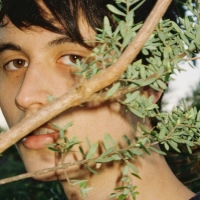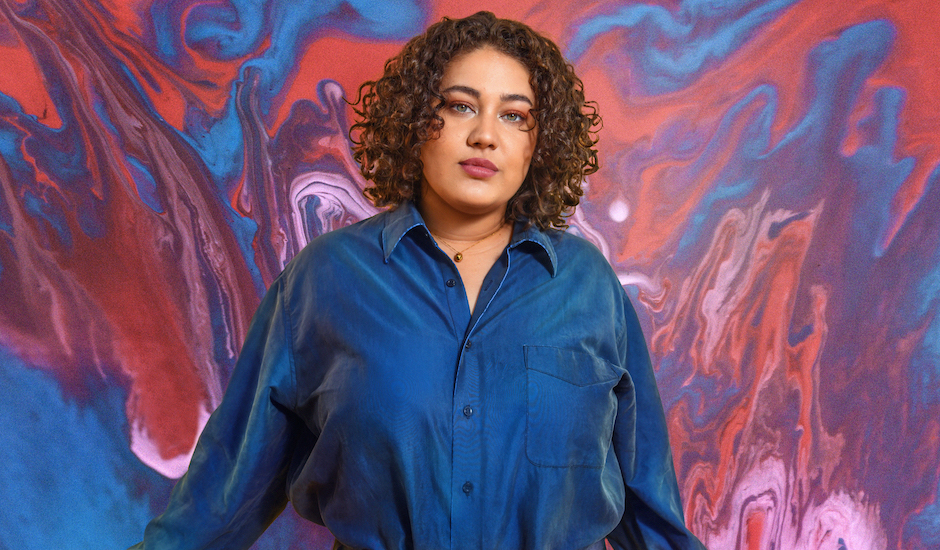 Do you know who you are? Nick Ward, and the questioning of selfOn his Everything I Wish I Told You EP, Nick Ward takes a tender look at identity, understanding, and the complex self.
Do you know who you are? Nick Ward, and the questioning of selfOn his Everything I Wish I Told You EP, Nick Ward takes a tender look at identity, understanding, and the complex self.

The pain and hope of Herald, Odette’s deeply personal new album
Three years since her spectacular debut To A Stranger, Georgia Sallybanks explores her darkest moments with a second record.
Content Warning: This article mentions experiences of mental illness, including attempted suicide. Need to talk to someone? Call Lifeline on 13 11 14, Kids Helpline on 1800 551 800, MensLine Australia on 1300 789 978, Suicide Call Back Service on 1300 659 467, Beyond Blue on 1300 22 46 36, Headspace on 1800 650 890 or QLife – for LGBTQ+ persons – on 1800 184 527
Header image by Giulia McGauran.
The task of writing your debut album can often be the most difficult part of a musician’s career, considering the unexpected learning curves and expenses - both monetary and emotionally - tied into the process. However, the time following is often freeing. It all feels worth it, in a way, watching the world interact with your lyrics and stories, finding themselves in your words and every ounce of passion you brought to the record.
You’d expect that Georgia Odette Sallybanks - who most people know under her musical pseudonym Odette - to have a similar experience, considering her debut album To A Stranger was one of the most intimate and well-acclaimed of its year. Released in 2018, To A Stranger was a graceful combination of poetry and reflection that excelled in its songwriting, bringing you into her world and leaving you not just more in-tune to the then-21-year-old musician, but also to yourself in the process. The record had the rare quality that allows you to see fragments of yourself within its lyrical core - even if the album was completely built from Odette’s own experiences - and as such, she blossomed into a voice representative of many; her inboxes deep with people’s own moments of weakness and strength, and how they felt seen by Odette’s work.
It was a surprise then, to hear that Odette was depressed once To A Stranger finished its eventual roll-out. Very depressed. Her new album Herald soundtracks much of that time, born out of weakness and sickness; a snapshot of a period she’d prefer to put out to the world and then forget about. Instead, she was not able to.
“I felt the worst when I found out that it might not be a year until [Herald] would be released, and I was sort of like ‘well fuck me, what am I going to do?’” She says, half-laughing on a Zoom call as she ponders a question that almost every artist will face in their career. “I don’t have any skills. I don’t have anything else to do.”
Instead of leaving behind that part of her life like planned, Odette was forced to sit with it; mulling over the experiences and stories told on Herald while she and her label attempted to navigate releasing music amongst a global pandemic. It was a frustrating time, especially considering the album was one that brought tremendous pain to listen back to. “It was a bit of a despairing moment.”

If To A Stranger is an introduction to Odette, then Herald is an exploration of her darkest moments, one that goes way beyond any first impression. A lot of the record stems from the ending of a toxic relationship; the break-up being the creative push needed to write much of Herald’s demos. “Songs were being written before then, but they were a bit…” She trails off. “When the break-up happened I kinda just went ‘fuck it’, and exploded with these very intense songs.” She began to use songwriting as a means of channelling these emotions while reflecting and evaluating on herself, not just in the context of the break-up, but also in her own identity and values more generally-speaking.
“Writing Herald allowed me to say everything out loud,” she says. “Often, my experiences can kind of come to me as existence soup, and things are super unclear and vague. Music - and writing this album - is a way to make sense of things and give myself perspective.”
As such, Herald is a learning curve - much more than her debut album. It soundtracks Odette’s exploration of self-sabotage and accountability, from the discovery of her faults and the vulnerability that followed to the self-analysis needed to pluck these apart, and the growth and evolution that came afterwards. It’s an album that doesn’t just centre itself on the core of her problems, whether that be Odette’s actions or those of people around her. It’s an album that dissects how she found those problems; how she pulled apart and broke down every facet and emotion related to those problems; and how she grows and empowers herself by analysing these problems.
Herald emphasises every stage of this emotional cycle of-kinds. The album’s beginning is intense with passion and rage, showcased through songs like Trial By Fire - a cathartic and confrontational message for a parent - and Dwell, which centres itself on the numbness of drugs and addiction. They’re songs that have frustration at their centre, even if they lead to other things.
At When I Know Is Not Enough, however, things begin to change. It’s a song still centre-pieced by negativity as it explores the break-up and the mental imbalance that followed, but this time around, it comes from a place of self-realisation, and that the problem perhaps comes from within: “I hope that I'll be more than this / I hope that I'll know more than this,” the chorus beams. The songs that follow grow on this, too. I Miss You, I’m Sorry sees Odette confront her mistakes in the context of the break-up, while Foghorn, the album’s most dramatic and intense moment, reflects on a suicide attempt, and the sense of longing - the yearning, of-kinds - that follows.
Then, there is the album’s end, where you feel Odette break free from the mental shackles and make peace with herself. The Hermitude-assisted Feverbreak does so through lyrical metaphors ending in Odette breaking free and connecting with herself and her emotions, while Amends - as the title suggests - makes peace. Mandible, the album’s final moment, is too the final nail in Odette’s turmoil, seeing her reach out without fear and looking forward into what’s next. “I’m feeling a bit better now,” she tells me.

The cathartic journey that fuels Herald can also be traced right down to its production, especially when placed side-by-side to its predecessor. Where To A Stranger fluttered with its tender moments of beauty, Herald is rich with production theatrics and drama; the frustration, rage and internal confusion brought to life in sounds that are far bolder and experimental to those we’ve heard from Odette in the past. Producer Damian Taylor - who counts Björk in his repertoire, alongside Odette’s past work - encouraged her to branch out to the warping universe that Herald lives in, where the melodies feel more invigorated and the sampling more alarmed than the first time around.
To a surface level listener, the production of Herald can almost make you forget that you’re listening to one of the deepest, most personal records of the last few years. “One of things I used as a motif through this record is comfort around these discussions,” she says. She points out the contrast of Foghorn - “which is very dramatic, very intense” and Mandible, which has this “almost sweet hope, sweet little prairie girl imagery.” Every sound is purposeful, and builds into the greater themes spread through the songs. “Ultimately, they’re all different exploration of different feelings, and I think the production reflects that,” she continues. “Mandible has this sweet hope to it because it’s how I want to be; I have hope for the future.”
There are nods to Robyn, in that sense; in how the album’s production can bring comfort, even if the lyrics are far darker and emotional. For Odette, much of this comes from the album’s goal of avoiding the romanticisation of rage and frustration; to talk about “nuanced expression and emotions” but with an end goal of coming out on top, and being healthy. “There are a lot of motifs in the record like bug sounds and certain instruments like cellos and clarinets, which are my comfort zones,” she explains. “We wanted to create a world for me to walk through as I’m navigating all of this shit.”
Bugs, interestingly enough, are a common thread between Odette’s music and coping mechanisms, especially before being diagnosed with borderline personality disorder. You can hear them flutter amongst the backdrop of Herald’s production, and for Odette, their presence is a reminder of the greater world around her. “I’ll just be having a cry in the park and I’ll just see a little centipede crawling along, and it’s like ‘Oh, that’s right, the world is turning and things exist outside of my perception.’ It reminds me that it’s not all about me,” she explains.
Being diagnosed with borderline personality disorder - BPD, for short - brought a sense of understanding to Odette; an explanation to the foundations of her emotions, and the ups-and-downs depicted throughout Herald. “The troubling thing [living with BPD] was me getting very self-absorbed, which this record is kind-of a marker of,” she elaborates. “I put these little sounds in my music to remind me to step outside of that for a minute and ground myself.”
Now, over a year following Herald’s creation and now passed its release, Odette is finally able to move beyond this period of her life, one she’s happy to leave behind. “I addressed a lot of flaws and self-absorbed feelings [on Herald], and it’s interesting realising that I completely lived in my own world,” she answers, asked what she learnt from the creation of the album. “I’m not going to shame myself for that because I had to for certain reasons, but it’s interesting how it became something that, while maybe helping me in my childhood, now hinders my ability to connect and feel safe, loved, understood and cared about.”
Even now, as we talk amongst the scattered fragments of Herald’s singles, Odette is already feeling understood and cared about. “It’s been wonderful, everyone has been so kind and understanding,” she says, asked how it’s been watching people interact with such intimate snapshots of her life. “I feel like most of the people who connect with my music have experienced some sense of intense emotion and have not known what to do or how to put it into words. That’s where I come in, because all I do is put things into words.
“People find [my music] really affirming of their own experiences, and that’s really nice because it’s always good to feel like you’re not the only one experiencing something. I know how that feels.”
Chances are that even on a record so deeply personal and intimate to Odette like Herald, people who have never met her are going to find themselves in her lyrics. That is, after all, what Odette does best.
Odette's new album, Herald, is out now via EMI Music Australia. Catch her around the country this May and June, more information and tickets here.
 Do you know who you are? Nick Ward, and the questioning of selfOn his Everything I Wish I Told You EP, Nick Ward takes a tender look at identity, understanding, and the complex self.
Do you know who you are? Nick Ward, and the questioning of selfOn his Everything I Wish I Told You EP, Nick Ward takes a tender look at identity, understanding, and the complex self.
 SG Lewis, on capturing the escapism of dance music without clubsOn his debut album times, the UK producer pays tribute to the therapy of dance music, in a time where it’s missed the most.
SG Lewis, on capturing the escapism of dance music without clubsOn his debut album times, the UK producer pays tribute to the therapy of dance music, in a time where it’s missed the most.